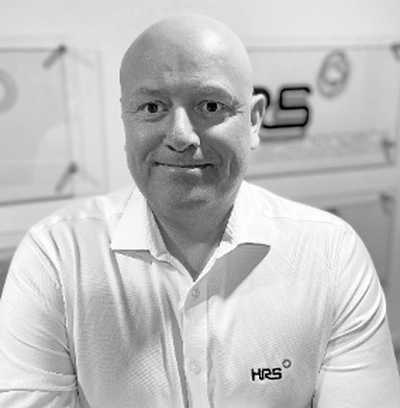resource conservation : Creating value from livestock waste
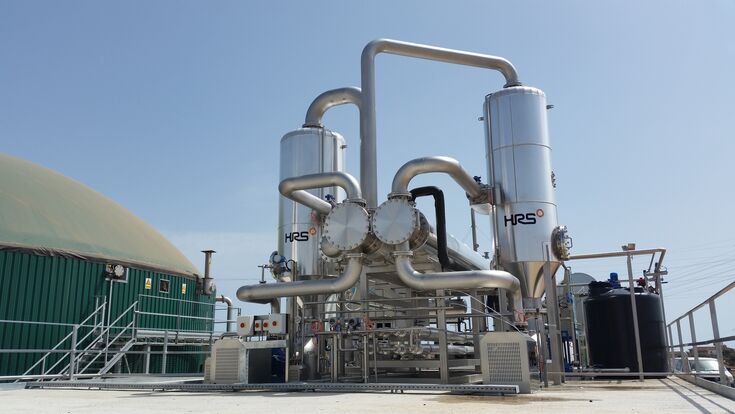
The HRS Digestate Concentration System (DCS) is specifically designed to reduce the volume of digestate from anaerobic digestion (AD) systems.
- © HRS Heat ExchangersThe scale of the problem
The World Bank estimates that human waste generation will increase from 2.01 billion tonnes in 2016 to 3.40 billion tonnes in 2050, with 40% of global municipal waste being food and green waste. Other sources of organic waste include crop residues, livestock manures and sewage.
Livestock manure is a significant source of organic waste materials. Although accurate figures are harder to come by (and vary significantly by region, the Agricultural Research Service (ARS) of the U.S. Department of Agriculture (USDA) estimates that In the United States, as much as [1.3 billion tonnes] of manure is produced by the 9.8 billion heads of livestock and poultry produced yearly. As these figures show, livestock manures and slurries account for as much organic waste material as other sources. This is significant as global greenhouse gas (GHG) emissions from livestock supply chains are estimated at [more than] 7.1 gigatonnes CO2e per year.
The benefits of a circular approach
It is now widely accepted that the traditional model of a linear economy – where raw materials are mined or abstracted, refined, turned into goods, utilised, and then discarded at the end of their useful life – is not only wasteful, but unsustainable. In fact, over the course of human history such a linear model has been the exception, rather than the rule – becoming established as a concept around the same time as the first industrial revolution from the mid-18th century onwards.
In a circular economy, bio-waste is not landfilled and incinerated. Instead, it forms a resource for organic soil improvers, fertilisers, growing media component and bio-based products.
The UN Environment Programme and Climate and Clean Air Coalition has identified the treatment of organic wastes as being the most ‘immediate and cost-effective’ way to keep global warming below 2°C, with anaerobic digestion identified as a key technology. Organic wastes contain significant quantities of useful plant nutrients and organic matter, but if not treated properly can lead to environmental pollution and produce large quantities of greenhouse gases, such as methane and nitrous oxide.
Therefore, intercepting these organic waste streams, and livestock manures in particular, and treating them appropriately provides a number of environmental benefits:
- Prevents direct GHG emissions from the decomposition of the wastes
- Prevents environmental contamination through incorrect disposal (e.g., phosphate and nitrate pollution of water courses)
- Aids odour management in sectors such as agriculture and sewage treatment
- Has the potential to provide renewable energy via processes such as anaerobic digestion
- Provides renewable, organic fertiliser and reduces the pressure on finite resources such as potash
- Improves soil health through the use of renewable fertiliser with higher levels of organic carbon and organic matter
- Reduces indirect GHG emissions associated with the production of synthetic fertiliser
Tackling organic waste
As with any waste management, the first priority should be to prevent and minimise organic wastes and manures, but unavoidable organic waste is increasingly being intercepted and treated globally with technologies including anaerobic digestion and composting.
HRS has worked with a number of partners around the world to treat and valorise organic wastes from a range of sources, including sewage treatment, on-farm manures and slurries, and crop and food waste. For example, the company has installed practical manure and digestate management systems, the first of which was commissioned in Spain, treating up to 12 tonnes of pig manure from a number of nearby farms every hour.
HRS has produced a wide range of systems for the pre-treatment, evaporation, pasteurisation and concentration of organic waste streams and the products of organic waste treatment, including manure, slurry, sludge and digestate. These systems are designed to reduce cost (for example by reducing the volume of material which needs to be treated, stored or transported) or increase value (by ensuring that biofertiliser is safe for crops and people) as well as being energy efficient and often improving the overall efficiency of the treatment process (for example, by reducing the need for external heat sources by recovering and utilising waste heat).
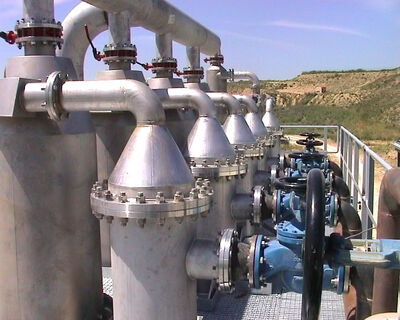
HRS evaporation and concentration systems
HRS treatment systems are particularly effective when used with liquid, or semi-liquid, waste streams, such as slurry, sludges or unseparated digestate. Evaporation is an efficient way of reducing the volume of effluents and wastes. HRS evaporation systems raise effluent, digestate or liquid waste to its boiling point (under vacuum) so that water is evaporated and then condensed, thereby obtaining a concentrated end product and condensate.
HRS evaporation systems are frequently integrated with waste heat sources to achieve an effective and sustainable process, which maximizes energy efficiency and reduces running costs. Using its 40 years of experience, HRS now offers a range of evaporation systems, although bespoke solutions are also available. These systems include:
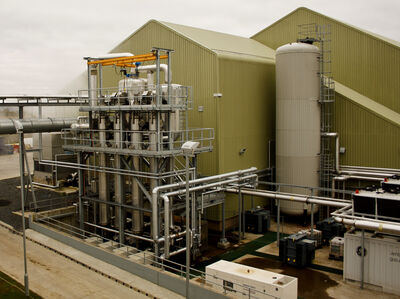
HRS corrugated tube evaporation systems
These are designed for the evaporation of low viscosity effluents with reduced particle size, like wastewater, brines, and effluents with low concentrations of organic solids. These systems utilize HRS K Series corrugated heat exchangers as evaporator modules, providing high heat transfer and good resistance against fouling.
HRS scraped surface evaporation systems
When concentrating fluids with elevated viscosities (which lowers heat transfer) or those which have a higher fouling risk, such as organic solutions with high dry matter concentration, HRS uses its HRS Unicus Series of reciprocating scraped-surface heat exchangers for evaporation systems.
HRS Digestate Concentration System
The HRS Digestate Concentration System (DCS) is specifically designed to reduce the volume of digestate from anaerobic digestion (AD) systems. In most situations the process utilizes surplus heat from the CHP engine. The DCS works by superheating digestate in a vacuum to facilitate concentration, using evaporation to significantly reduce digestate volumes while, at the same time, increasing the nutrient content and commercial value.
The HRS DCS is a multi-effect system, in which the steam produced from this first heating cycle is re-used as the heating media for the second, and subsequent, effects. The number of effects is determined by the level of dry solids required, and the amount of spare heat available, up to a maximum of four cycles. After the final effect, the steam is condensed back into water and can then be used to dilute feedstock going into the front end of the digester, creating a completely closed loop system. The DCS is wholly self-sufficient – no energy or water is brought in or wasted, and everything is re-used.
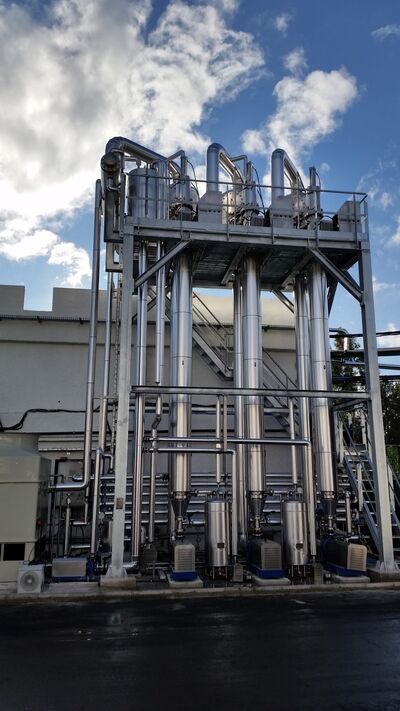
Around the world HRS is working with partners across the livestock supply and processing chain to help them reduce disposal costs, create value added co-products, and reclaim clean water from organic waste streams. Some of these companies are now selling high value fertiliser products into both professional and amateur markets, while the use of biogas for energy (for heat, electrical power or use as renewable natural gas) continues to increase globally. In addition, more and more companies are also looking to extract valuable products from organic waste streams, such as struvite and phosphate. Whatever your aims, speak to us today to learn how we can help you create value from your livestock wastes.
About HRS Heat Exchangers
Located in the UK, HRS Heat Exchangers is part of the EIL Group (Exchanger Industries Limited) which operates at the forefront of thermal technology. HRS offers innovative heat transfer solutions worldwide across a diverse range of industries. With 40 years’ experience in the environmental, anaerobic digestion and waste sectors, specialising in the design and manufacture of an extensive range of turnkey systems and components, incorporating our corrugated tubular and scraped surface heat exchanger technology, HRS products are compliant with global design and industry standards. HRS has a network of offices throughout the world: Australia, Canada, New Zealand, UK, Spain, USA, Malaysia and India; with manufacturing plants in the UK, India, Spain and Canada.
